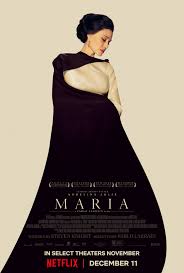
MARIA
Germany, 2024, 124 minutes, Colour.
Angelina Jolie, Pierfrancesco Favini, Alba Rohrwacher, Haluk Bilginer, Kodi Smit-McPhee, Stephen Ashfield, Valeria Golina, Caspar Phillipson.
Directed by Pablo Larrain.
It is almost 50 years since the death of famed opera singer, Maria Callas. She died in 1977, aged 53. Franco Zeffirelli made a film of the last week of her life, Callas Forever, with Fanny Ardant. Fanny Ardant collaborated with documentary filmmaker, Tom Volf’s documentary, 2017 documentary, Maria by Callas.
This is a film for both older audiences and younger audiences. It will offer older audiences the opportunity to remember, to listen again to the many arias throughout this film, the voice of Callas herself. The film will offer to those younger, who don’t remember her, a vivid portrait.
The film was written by English screenwriter, Steven Knight (Pretty Dirty Things, Peaky Blinders and many films and television series) but, importantly, was directed by the Chilean, Pablo Larrain, directors of significant political films but also two other biographies of significant 20th century women, Jackie (Jacqueline Kennedy Onassis) and Spencer (Princess Diana). Interestingly, there is the common denominator of Aristotle Onassis in Jackie and Maria.
And the choice of Angelina Jolie. She moves quite majestically through the film, often sweepingly, not only a prima donna, but one might say the sola donna, proud, sometimes arrogant in her interactions with people. The main focus is on the last week of her life, opening with her death, flashbacks of the previous week but, of course, flashbacks to past performances and achievements, and memories of her relationship with Onassis, and the insertion of an episode of meeting Jacqueline Kennedy at a party, present at the birthday where Marilyn Monroe sang (and some acid comments on her voice), and an icy encounter with JFK. (Callas in fact sang at this occasion.)
However, the main supporting characters here are her to devoted servants, her butler and her housemaid of many years, played by Italian stars, Pierfrancesco Favini and Alba Rohrwacher. We look at the ways she interacts with them, as she speaks to them, always superior, but a deep affection and sometimes dependence on them.
There is also the device of her wandering around Paris, stopping at various locations, flashbacks to performances, especially an orchestra playing in the rain, a scene from Madame Butterfly… And, during this wandering, there is a young filmmaker, Kodi Smit McPhee, called Mandrax, the drug that she was taking for support, her interactions with Mandrax, her conversations, his response, final hallucinations as she reviews her life.
This is a portrait of Maria Callas rather than a biography, an opportunity to listen again, to appreciate, to wonder at the complexities of personality for figures in the public eye.
- Audience knowledge of and admiration for Maria Callas, her voice, performance, career? What is knowledge of her life, mother, the war, criticisms of being fat, her emergence, her husband, the encounter with Aristotle Onassis, life with him, separating from him, her loss of her voice, her final years?
- The work of the director, his portrait of Jacqueline Kennedy, of Princess Diana, and the into cutting off the two women and their lives with Onassis?
- The framework of the film, the opening with Maria Callas’s death, her assistance standing around, the flashback of the seven days, the flashbacks within flashbacks, her performances, black-and-white photography, Angelina Jolie and her voice, the lip syncing with Maria Callas’s voice, the locations and her memories, her tablets, the filmmaker and her hallucinations, the conversations? The clash with her doctor? Of the theatre with the pianist, the technician in the spotlight, the journalist and his later confrontation?
- The importance of Ferrucio and Bruna? With Maria Callas for so many years, butler, housekeeper, with her in Paris, Bruna and the meals, the conversation, The ratio and the moving of the piano, concern about the doctor, that Maria Callas’ beck and call, her treatment of them, her dependence on them, their loyal service? The memories of being at her performances in the past? The concern in the present, her death?
- The film offering an overview of Maria Callas’ career, born in New York, her mother, the German soldiers, in Venice, the initial success, the visualising of the various concerts, the buildings in Paris, the performance in the rain with the orchestra, Madame Butterfly, her success, the decline? For testing her voice, but wanting to listen to her records? The final aria?
- Her personal relationships, the glimpse of her husband, at the party, the encounter with Onassis, his estimation of himself, rich and powerful, his infatuation with her, the invitation to the yacht, going with her husband, the beginning of the relationship, Onassis’ love for her, her moving away, not marrying, the issue of children, not wanting to be controlled? But her final visit to him?
- The contrivance of the scene at Kennedy’s birthday party, Marilyn Monroe’s happy birthday song, her comments of Marilyn Monror and the voice, the encounter with Jackie Kennedy, the yacht, the discussions with Kennedy himself, her estimation of himself and the relationships?
- The device of the film, the director and the name of the drug, Mandrax, the interviews, his responses, initially stolid, mellowing, the various scenes and interviews? The device, the hallucinations from her drugs? Herself revelations?
- The prima donna, the diva, her arrogance, treatment of people, the fan who had missed her performance and her treatment of him, the attack on the intrusive journalist, the conversation with the man at the bar and her music?
- The film as a portrait rather than a biography? Angelina Jolie’s performance? The sequences of actual Maria Callas during the final credits – more smiling and genial and throughout the film?